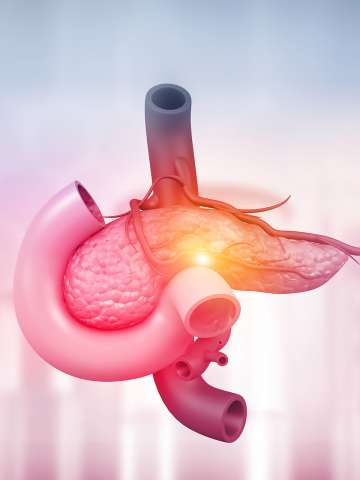Pancreatic Diseases, Cancers and Treatments
UCLA Health specialists work together to diagnose and treat all types of pancreatic disease and pancreatic cancer. With a team approach, we offer advanced diagnostics and the latest treatments.

Why choose UCLA Health for pancreatic disease care?
Our specialists work as a cohesive team to deliver exceptional care. We treat all types of pancreatic diseases and pancreatic cancer. Highlights of our program include:
Integrated care: Our unique patient care model focuses on bringing together a team of experts in one central location. We arrange for you to see several specialists in a single visit, making treatments more efficient, seamless and convenient. Your team may include oncologists, surgeons and radiologists who work closely to deliver individualized care.
Advanced pancreas treatments: We offer tests and therapies that aren’t available at other hospitals. People come to us from all over the United States to receive the highest level of care. Our experts lead the nation in state-of-the-art diagnostics and sophisticated treatments.
Experience and expertise: Our highly skilled team performs more pancreatic surgeries than most hospitals in Southern California. We put our expertise to work for you, resulting in fewer complications and better outcomes. Our pancreatic cancer survival rates are among the best in the nation.
Research and clinical trials: If you’re eligible, you’ll have access to clinical trials for promising new treatments for pancreatic cancer and other pancreatic disease. As part of our commitment to pioneering advanced treatments, our research team meets often to discuss clinical trials on the horizon.
Our areas of pancreatic care
As leaders in the latest treatments for pancreatic diseases and cancers, our team works closely to deliver a precise diagnosis and outstanding care. Our services include:
Sophisticated diagnostic technology
UCLA Health offers some of the most advanced imaging technology available. To deliver an accurate diagnosis, we use:
Gallium-68 DOTATATE PET scan: We are one of the few hospitals in the nation to use this advanced imaging study to diagnose a rare type of pancreatic cancer. This test helps us diagnose even small tumors, develop more effective treatment plans and deliver treatments earlier than ever before.
Interventional endoscopy: Our diagnostic team includes experienced interventional endoscopists. During an endoscopy, our doctors use a long, thin tube with a camera and light to view the digestive tract. We provide precise diagnostics and treatments during a simple outpatient procedure. Learn more about our interventional endoscopy team.
Specialized imaging technology: We are highly skilled at using advanced MRI and CT scans that provide detailed images. Specialized imaging allows us to diagnose pancreas and bile duct diseases with unmatched precision.
Advanced pancreas treatments
When you come to UCLA Health, you have access to treatments that aren’t available elsewhere. Using the latest techniques, we treat even the most complex pancreatic disorders and cancers. Our experts lead the nation in innovative treatments for pancreatitis and pancreatic cancer.
Integrated pancreatic disease care
You can expect to receive comprehensive care from a team of specialists dedicated to you. Our team-based care model means you are diagnosed and treated more quickly.
Experts work across departments to deliver integrated care. In one convenient visit, you may see several specialists, such as an interventional endoscopist, gastroenterologist and registered dietitian.
You also have a dedicated nurse coordinator who guides you through your care plan, helps you make appointments and answers questions. As a team, we review your treatment plan and work together to monitor your progress.
Pancreaticobiliary conditions we treat
Your care team includes nationally recognized experts in treatments for all disorders and injuries that affect the pancreas, gallbladder and bile ducts (pancreaticobiliary diseases). We specialize in treatments for:
Pancreatic cancer and pancreatic disease
We deliver integrated care for a wide range of pancreatic disorders. Our services include the latest treatments for:
Acute pancreatitis: This painful inflammation of the pancreas can cause complications such as pancreatic cysts and abscesses (pus-filled cavities). In severe cases, a pancreatic fistula (small opening) can develop. Episodes of acute pancreatitis usually last about a week. Your doctor manages symptoms and treats the cause.
Chronic pancreatitis: An inflammatory disorder, chronic pancreatitis causes long-term symptoms such as abdominal pain and weight loss. Over time, this condition destroys pancreatic tissue and replaces it with scar tissue, which damages the body’s ability to digest food. We treat alcoholic pancreatitis and idiopathic pancreatitis, which has no known cause.
Pancreatic adenocarcinoma: The most common type of pancreatic cancer, this occurs when normal cells in the pancreas grow and multiply uncontrollably. It causes problems with the pancreas as well as the liver, gallbladder and bile duct.
Pancreatic cysts: These cysts are small pockets of fluid that grow in the pancreas. Most pancreatic cysts are benign (noncancerous).
Pancreatic neuroendocrine tumors (NETs): This rare type of pancreatic cancer develops in the hormone-producing, or endocrine, cells of the pancreas.
Bile duct diseases
Specialists come together to deliver treatments for cancer and disease of the bile ducts. These thin tubes carry fluid from the liver and gallbladder to the small intestine. Our expertise also includes conditions that affect the duodenum, the upper part of the small intestine. We treat:
Ampullary cancer: This cancer develops in the area where the bile duct and pancreatic duct meet.
Bile duct cancer (cholangiocarcinoma): This rare type of cancer causes abdominal pain, weight loss and stools the color of clay.
Bile duct cysts (choledochal cysts): These rare cysts cause enlargement of the bile duct. Untreated, they can increase the risk of bile duct cancer.
Duodenal polyps and duodenal cancer: Polyps (growths) develop in the upper part of the small intestine and can turn into cancer.
Treatments for pancreatic diseases
Using unparalleled expertise and a streamlined care model, we help you get the treatments you need as soon as possible. We lead the nation in advanced treatments for all diseases and disorders affecting the pancreas and bile ducts. With some of the best pancreatic cancer survival rates in the nation, we offer hope through innovative treatments, including:
Auto-islet transplant for chronic pancreatitis
UCLA Health is the only medical center in the Southwest and one of the few hospitals in the country to perform auto-islet transplant to treat chronic pancreatitis. During this procedure, skilled surgeons remove your pancreas (total pancreatectomy). Using advanced technology, they extract cells that produce insulin. Insulin is a hormone your pancreas makes. It helps you digest food and turn it into energy.
Your surgeon then transplants the insulin-producing cells into your liver. Following the procedure, your body is able to produce its own insulin. This procedure helps you avoid the need for long-term insulin injections. Auto-islet transplant requires an extremely high level of expertise and teamwork from experienced specialists.
Comprehensive pancreatic cancer treatments
We work as a team to develop customized treatment plans for pancreatic cancer. Our compassionate experts also offer support along the way. Your treatment plan may include:
Chemotherapy: Our medical oncologists provide a molecular analysis of each tumor so they can prescribe the most effective chemotherapy drugs. These powerful drugs destroy cancer cells.
Radiation therapy: Radiation oncologists use high-energy beams to kill cancer cells and reduce damage to healthy tissues. You may need radiation therapy along with other treatments, such as surgery or chemotherapy.
Pancreatic cancer surgery: If you’re eligible for surgery to treat pancreatic cancer, you can expect an experienced surgical team skilled at the latest techniques. We perform more than 100 pancreatic cancer surgeries every year, and we have some of the best surgical outcomes in the nation.
Minimally invasive endoscopic techniques
We have the largest interventional endoscopy team in Los Angeles. Advanced endoscopic procedures treat pancreatic disease using techniques that involve smaller incisions and less recovery time than traditional surgery. Our experts can diagnose and treat many bile duct diseases during a single visit.
Radiotherapy for pancreatic neuroendocrine tumors (NETs)
We are one of only a few hospitals in the nation to offer radiotherapy for NETs, a rare type of pancreatic cancer. We use a groundbreaking treatment called peptide receptor radionuclide therapy (PRRT). This therapy includes injecting a safe amount of radioactive material into the bloodstream to destroy cancer cells.
Specialists use advanced imaging technology to ensure that this procedure is incredibly precise. We’re able to target cancer cells while minimizing damage to healthy cells.
Meet our pancreatic care team
Our team includes specialists from several departments, including gastroenterology, interventional endoscopy, medical oncology and digestive health and wellness. We work together to deliver integrated, comprehensive care for pancreatic disease, pancreatic cancer and bile duct disease. Our specialists are experts in their fields.
Contact us
Our skilled specialists lead the nation in advanced diagnostics and treatments for pancreatic disease and pancreatic cancer. Call 310-206-6889 to connect with us.
Find your care
Our skilled specialists lead the nation in advanced diagnostics and treatments for pancreatic disease and pancreatic cancer. Call 310-206-6889 to connect with us.
Program News
UCLA Health Division of Surgical Oncology selected by the Canopy Cancer Collective to help advance care delivery to pancreatic cancer patients. Program news & videos.
